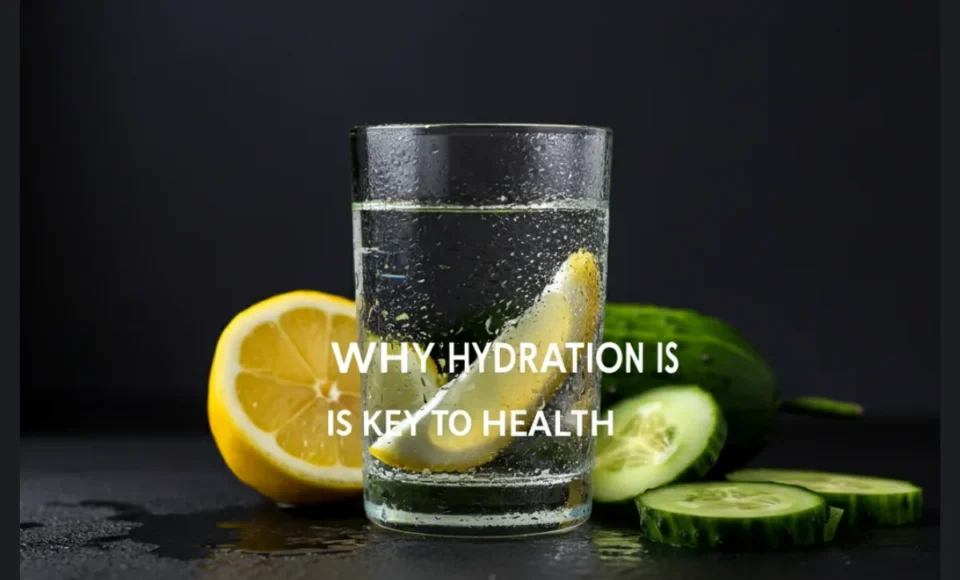Water is essential for life, yet its profound impact on our daily well-being is often underestimated. While we all know drinking water is important, understanding why hydration is key to health can transform how you approach your daily fluid intake. From powering your brain to protecting your joints, proper hydration is the foundation of a healthy, energetic life. This guide will explore the critical roles water plays in your body and provide practical tips to ensure you stay well-hydrated.
What Does Hydration Do for Your Body?
Every cell, tissue, and organ in your body needs water to function correctly. Water is a major component of your body, making up about 60% of your total weight. It’s involved in countless processes that you might not even think about.
Regulating Body Temperature
When you get hot, your body sweats. The evaporation of that sweat from your skin cools your body down. Without enough water, you can’t sweat properly, which can lead to overheating and heatstroke.
Transporting Nutrients and Oxygen
Water is the main component of blood, which is responsible for carrying essential nutrients and oxygen to your cells. Proper hydration ensures this delivery system runs smoothly, keeping your cells nourished and energized. You can learn more about how your body uses water from the CDC’s Healthy Eating resources.
The Link Between Hydration and Physical Performance
For anyone who is physically active, from casual walkers to competitive athletes, hydration is a game-changer. Even mild dehydration can significantly impair your physical performance, leading to fatigue, reduced endurance, and decreased motivation.
- Energy Levels: Dehydration can cause your energy levels to plummet. When you’re low on fluids, your heart has to work harder to pump blood, which can make simple physical tasks feel exhausting.
- Muscle Function: Water is crucial for muscle function and preventing cramps. Electrolytes, which are minerals that dissolve in water, are vital for muscle contractions.
- Joint Lubrication: Water helps lubricate the joints, reducing friction and preventing pain during movement. Staying hydrated keeps your cartilage soft and supple.
Cognitive Function and Mood Depend on Water
Your brain is strongly influenced by your hydration status. Understanding why hydration is key to health means recognizing its impact on your mental clarity and emotional stability. Even slight dehydration can affect concentration, alertness, and short-term memory.
Boosting Brainpower
Studies show that being well-hydrated can improve focus and cognitive performance. When your brain has enough water, you can think more clearly and process information more efficiently.
Stabilizing Your Mood
Dehydration has also been linked to increased feelings of anxiety and irritability. Ensuring you drink enough water throughout the day can contribute to a more stable and positive mood.
Hydration’s Role in Digestion and Detoxification
Water is essential for a healthy digestive system. It helps break down the food you eat, allowing your body to absorb the nutrients effectively. It also plays a vital role in preventing constipation by softening stool and promoting regular bowel movements.
- Aiding Nutrient Absorption: Water helps dissolve vitamins, minerals, and other nutrients from your food, making them more accessible for your body to use.
- Flushing Out Toxins: Your body relies on water to flush out waste products and toxins through urination and sweat. Proper hydration supports your kidneys and liver, your body’s primary detoxification organs. The National Institutes of Health offers more on hydration’s role in healthy aging.
How Hydration Promotes Healthy Skin
If you want glowing, healthy skin, one of the best things you can do is drink enough water. Dehydration can make your skin look dry, tight, and flaky, and it can even accentuate the appearance of fine lines and wrinkles. While it won’t erase wrinkles, proper hydration helps maintain skin elasticity and plumpness, giving you a healthier complexion.
Practical Tips for Staying Hydrated
Knowing why hydration is key to health is the first step; the next is putting it into practice. Don’t wait until you feel thirsty, as that’s already a sign that your body is dehydrated.
Make Water Your Go-To Drink
Carry a reusable water bottle with you throughout the day as a constant reminder to drink. If you find plain water boring, try infusing it with fruits like lemon, cucumber, or berries for a natural flavor boost.
Conclusion
The evidence is clear: hydration is a cornerstone of overall health. From enhancing physical performance and cognitive function to promoting healthy digestion and radiant skin, water is indispensable. By making a conscious effort to drink enough fluids daily, you are making a powerful investment in your long-term well-being and unlocking your body’s full potential.
Frequently Asked Questions
1. How much water should I drink per day?
A common recommendation is to drink eight 8-ounce glasses, which equals about 2 liters. However, individual needs can vary based on activity level, climate, and overall health.
2. Can I get hydration from other drinks besides water?
Yes, beverages like herbal tea, milk, and even coffee contribute to your daily fluid intake. Water-rich foods like fruits and vegetables also help you stay hydrated.
3. What are the signs of dehydration?
Common signs include thirst, dark yellow urine, fatigue, dizziness, and a dry mouth. It’s best to drink regularly throughout the day to prevent these symptoms.
4. Does drinking water help with weight loss?
Water can support weight loss by boosting your metabolism and helping you feel full, which may reduce overall calorie intake. It also helps your body burn fat more efficiently.
5. Is it possible to drink too much water?
While rare, it is possible to drink too much water, a condition known as hyponatremia, where sodium levels in your blood become dangerously low. This is typically only a concern for endurance athletes or individuals with certain health conditions.
You may also read : All-Natural Miracle Balm for Healing and Hydration

